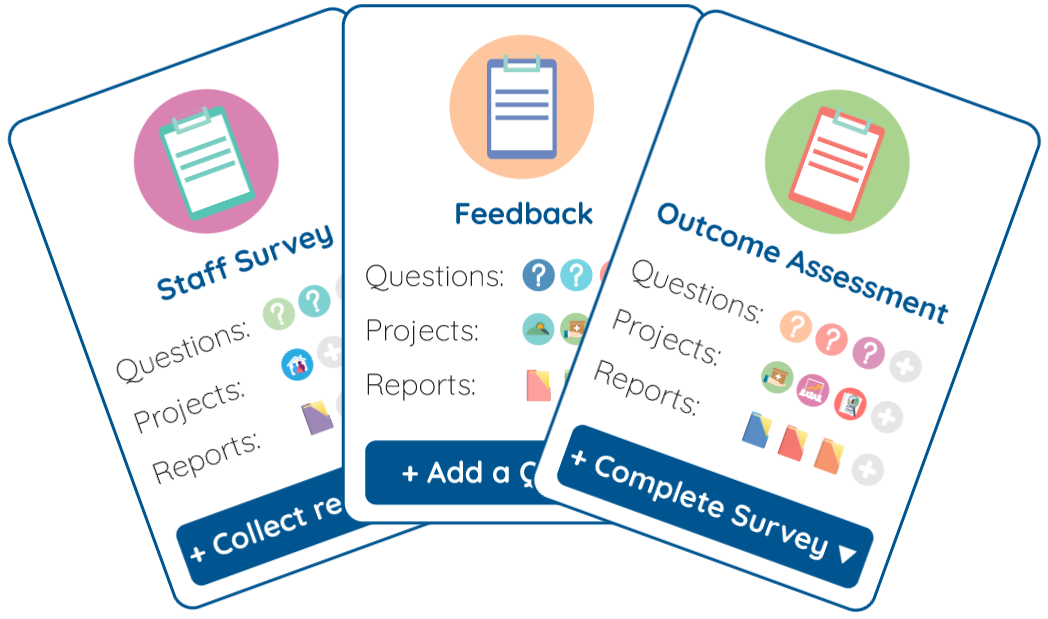-
Products
 All-4-in-One: Makerble® MissionToolkit™ The one-stop-shop to manage and report participant engagement across your programmes and services
All-4-in-One: Makerble® MissionToolkit™ The one-stop-shop to manage and report participant engagement across your programmes and services Communications: Makerble® CRM Centralise everything you need to know about everyone you influence. Collaborate securely, communicate effectively.
Communications: Makerble® CRM Centralise everything you need to know about everyone you influence. Collaborate securely, communicate effectively. Activities: Makerble® Scheduling Coordinate one-off and repeating events: take bookings, track attendance, collect feedback and measure impact
Activities: Makerble® Scheduling Coordinate one-off and repeating events: take bookings, track attendance, collect feedback and measure impact Insights: Makerble® Surveys Collect responses using trackable, anonymised or universal survey links that connect and compare before and after responses automatically
Insights: Makerble® Surveys Collect responses using trackable, anonymised or universal survey links that connect and compare before and after responses automatically Reporting: Makerble® Impact Track, share and analyse progress towards everything that matters - effortless reporting, impressive results
Reporting: Makerble® Impact Track, share and analyse progress towards everything that matters - effortless reporting, impressive results -
Solutions
Case Management & Service Delivery Deliver support with structure, care and accountability for every individual and group you serveCustomer Insight & Audience Experience Understand and improve the experience of every stakeholder you serve - from customers to communitiesEducation, Learning & Training Support and evaluate high-quality learning experiences - from classrooms to coaching programmesGrantmaking & Commissioning Manage grants and contracts with clarity, transparency and outcomes in mindImpact Reporting & Evaluation Measure what matters - use insight to drive smarter decisions and report better outcomesPeople, Culture & Inclusion Build an inclusive, empowered culture and track the change as you goResearch, Strategy, Innovation Fuel strategic thinking and stay ahead with benchmarking, progress monitoring, research and innovation tools
-
Resources
- Pricing
- Try for free
- Sign In
About
| Uploaded by: | Curated by Makerble |
Measure children’s perceived social support. This scale was designed to tap into the perceived support which significant others (parents, teacher, classmates and close friends) manifest toward the self. The scale measures whether perceived regard from others directly impacts perceived regard for the self. Furthermore, the scale can support consideration of the extent to which certain significant others had more or less of an impact that others.
*Q1.
Enter the name of the recepient (Text)
This question will appear once within your story or survey response.
*Q2.
Enter the age of the recipient in years. (Text)
This question will appear once within your story or survey response.
Q3.
Some kids like to do fun things with a lot of other people BUT Other kids like to do fun things with just a few people (single choice)
| Really true | Sort of true |
Dropdown List used: Some kids like to do fun things with a lot of other people BUT Other kids like to do fun things with just a few people
Q4.
Some kids have parents who don’t really understand them BUT Other kids have parents who really do understand them (single choice)
| Really true | Sort of true |
Dropdown List used: Some kids have parents who don’t really understand them BUT Other kids have parents who really do understand them
Q5.
Some kids have classmates who like them the way they are BUT Other kids have classmates who wish they were different (single choice)
| Really true | Sort of true |
Dropdown List used: Some kids have classmates who like them the way they are BUT Other kids have classmates who wish they were different
Q6.
Some kids have a teacher who helps them if they are upset or have a problem BUT Other kids don’t have a teacher who helps them if they are upset or have a problem (single choice)
| Really true | Sort of true |
Dropdown List used: Some kids have a teacher who helps them if they are upset or have a problem BUT Other kids don’t have a teacher who helps them if they are upset or have a problem
Q7.
Some kids have parents who don’t seem to want to hear about their children’s problems BUT Other kids have parents who do want to listen to their children’s problems (single choice)
| Really true | Sort of true |
Dropdown List used: Some kids have parents who don’t seem to want to hear about their children’s problems BUT Other kids have parents who do want to listen to their children’s problems
Q8.
Some kids have classmates who sometimes make fun of them BUT Other kids don’t have classmates who make fun of them (single choice)
| Really true | Sort of true |
Dropdown List used: Some kids have classmates who sometimes make fun of them BUT Other kids don’t have classmates who make fun of them
Q9.
Some kids have classmates who pay attention to what they say BUT Other kids have classmates who usually don’t pay attention to what they say (single choice)
| Really true | Sort of true |
Dropdown List used: Some kids have classmates who pay attention to what they say BUT Other kids have classmates who usually don’t pay attention to what they say
Q10.
Some kids don’t get asked to play in games with classmates very often BUT Other kids often get asked to play in games by their classmates (single choice)
| Really true | Sort of true |
Dropdown List used: Some kids don’t get asked to play in games with classmates very often BUT Other kids often get asked to play in games by their classmates
Q11.
Some kids don’t have a close friend who cares about their feelings BUT Other kids do have a close friend who cares about their feelings (single choice)
| Really true | Sort of true |
Dropdown List used: Some kids don’t have a close friend who cares about their feelings BUT Other kids do have a close friend who cares about their feelings
Collect survey responses

360°

Universal

Tracked
Anonymised

Import
API
Type Up: 1 at a time

Type Up: Several at once

Type Up: Manual Headcount

Universal Manual Headcount

Multi-stage

Branded Portal

Automation
X
Close









 Interval Versions
Interval Versions





